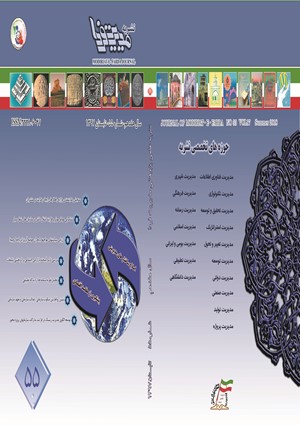بررسی تاثیر ابعاد برند خدمات بر وفاداری به برند با نقش واسط رضایت و نگرش نسبت به برند (مورد مطالعه مشتریان شعب بانک کشاورزی تربت حیدریه)
محورهای موضوعی :وجیهه هوشیار 1 , محمد رستم پور 2
1 - مدیریت
2 - موسسه آموزش عالی عطار
کلید واژه: وفاداری به برند, شواهد برند, رضایت, نگرش به برند, گفته ها و شنیده های برند,
چکیده مقاله :
امروزه، پژوهش در خصوص برند، جایگاه ویژهای در حوزه کسب و کار یافته است. این مساله از طریق تاثیری که بر رضایت و وفاداری مشتریان دارد، میتواند در بقا و حیات یک نهاد خدماتی تاثیر به سزایی داشته باشد. در همین راستا تحقیق حاضر با هدف بررسی اثر ابعاد برند خدمات بر وفاداری مشتریان به یک برند؛ قصد صحه گذاری بر این موضوع را دارد. جامعه آماری این تحقیق مشتریان شعب بانک کشاورزی شهر تربت حیدریه هستند، که تعداد 322 نفر از آنان به شیوه نمونه گیری تصادفی، به عنوان نمونه انتخاب شدند. برای جمع آوری داده ها از پرسشنامه استاندارد استفاده شده است و جهت بررسی روایی از تحلیل عاملی تاییدی استفاده گردید و روایی تمام متغیرها مورد تایید واقع شد. جهت سنجش پایایی نیز از آلفای کرونباخ استفاده شد و آلفای کرونباخ تمامی متغیرها در سطح قابل قبول به دست آمد. به منظور تجزیه و تحلیل داده ها و آزمون فرضیه ها از روش معادلات ساختاری استفاده شد. نتایج نشان داد شواهد برند، گفته ها و شنیده های برند و رضایت مشتریان بانک کشاورزی بر نگرش نسبت به برند و نگرش نسبت به برند نیز بر روی وفاداری مشتریان بانک کشاورزی تاثیرگذار می باشد.
Today, research on brand has acquired a special position in business, because the issue, through its impact on customer satisfaction and loyalty, can be very influential in the survival and life of a service entity. Accordingly, the purpose of this research is to investigate the effect of service brand dimensions on customer loyalty to a brand. The study was conducted in the population of customers of Keshavarzi Bank branches in Torbat-e Heydarieh. We tested the effect of brand dimensions (brand evidence, brand hearsay) on customer satisfaction and brand attitude as well as the effect of brand attitude on customer loyalty through seven hypotheses. For this purpose, we used structural equation modeling and LISREL software. Hypothesis testing was conducted on a sample of 322 subjects that were selected by random sampling method. Confirmatory factor analysis was used to assess the validity of research instrument (questionnaire), and the results showed an acceptable validity for each variable in the questionnaire (test statistic for all variables was higher than 4%). The reliability of the questionnaire was measured using Cronbach’s alpha test and the test statistic for all variable was higher than 7%, which indicates that the questionnaire has a good reliability. Moreover, all the seven hypotheses of the study were confirmed.
